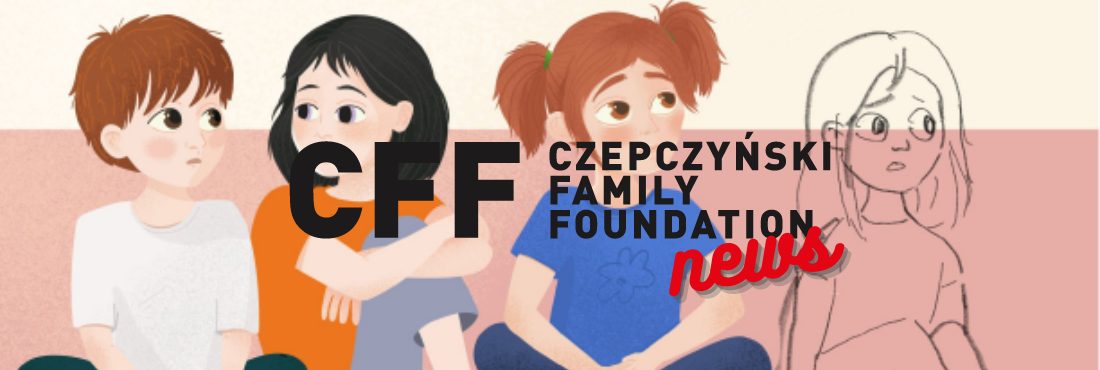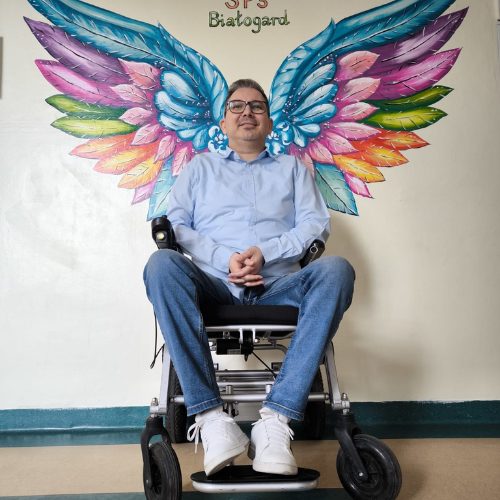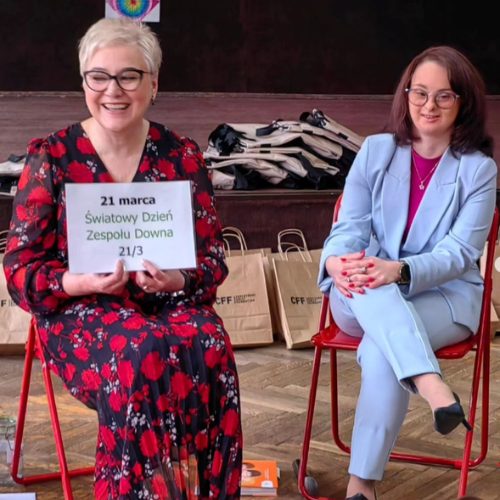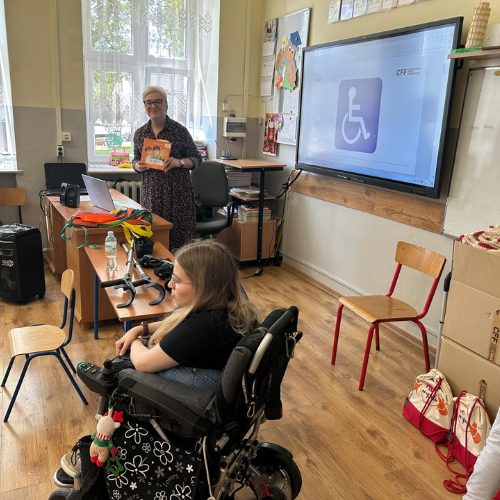Over the past six months, our team has been exceptionally busy. Our dedication to children’s education has led to numerous projects both in Poland and internationally. We highlighted CFF’s work in the European Parliament and the Polish Senate, emphasizing the key role of education in shaping the future of young generations.
By engaging directly with teachers, parents, and children in kindergartens and primary schools, we have gained fresh inspiration for advancing our educational projects.
European Debate on Inclusive Education

On April 17th, a debate on inclusive education for children was convened at the European Parliament by Ewa Kopacz, Vice-President and Coordinator for children’s rights.
The gathering brought together practitioners, experts, education sector representatives, European Commission officials, and Members of the European Parliament from across EU countries. The objective was to discuss the pivotal role of schools and to exchange best practices and tools supporting educators and policymakers in promoting inclusion among children.
At our invitation, Dominika Kasińska, coordinator of the ABC of Empathy project, participated in the debate, emphasizing the employment challenges faced by individuals with Down syndrome.
The event served as a crucial platform for discussing strategies to foster more inclusive societies through the education system. Participants engaged actively, posing questions and offering comments both in person and via online channels. Additionally, the meeting was translated into six languages to ensure accessibility and widespread participation.
Watch the debate summary and the broadcast.
ABC of Empathy lessons
Following the debate, a lessons on the ABC of Empathy was conducted at the Joachim Lelewel Polish School in Brussels. The session was facilitated by the CFF team, along with Dominika Kasińska, who provided insights into the daily life of individuals with Down syndrome and addressed the children’s inquiries directly
“ABC of Empathy” has been included in a document containing EU recommendations
As a result of the conference in the European Parliament and our collaboration with the Learning for Wellbeing Foundation, the “ABC of Empathy” has been included in a document containing recommendations for schools, teachers, and policymakers across the entire European Union.
Art & emotions
The conference at the European Parliament was complemented by an evening vernissage, which we co-hosted with the Katarzyna Napiórkowska Art Gallery in Brussels. This provided a wonderful opportunity to continue discussions in a more relaxed and informal environment.
Global Money Week 2024
This annual initiative, spearheaded by the OECD, focuses on educating children and youth about finance, money management, and making informed financial decisions. It encompasses a range of activities, workshops, and educational programs globally to enhance economic literacy.
As part of this year’s campaign, we orchestrated an international online debate involving representatives from the OECD, the European Parents’ Association, and delegates from six countries: France, Italy, Sweden, Norway, Poland, and Ukraine.
The Year of Economic Education
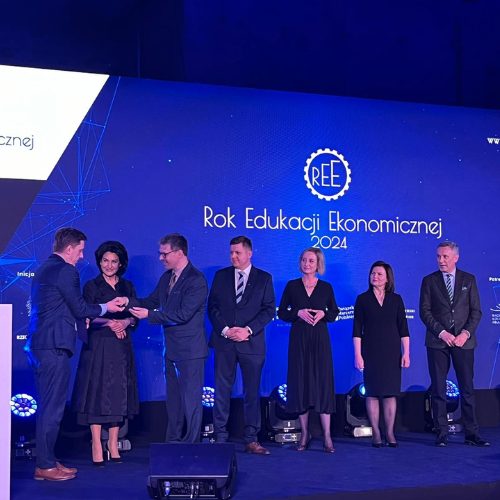
Educational initiatives in banking and capital markets are increasingly pivotal in addressing knowledge gaps related to the economy, investments, and personal finance management. In response to these challenges, the Year of Economic Education 2024 has been launched.
Supported by several prominent organizations including the GPW Foundation, the Youth Entrepreneurship Foundation, the Czepczyński Family Foundation, the Warsaw Banking Institute Foundation, the Polish Economic Society, and the Polish Scouting and Guiding Association, this initiative received endorsement through a resolution of the Senate of the Republic of Poland on September 7, 2023.
The ceremonial inauguration of the Year of Economic Education was attended by dignitaries such as the Marshal of the Senate, Małgorzata Kidawa-Błońska, representatives from various ministries, and over 100 participants from academia, business, NGOs, and the media.
160 Kindergartens in Poland join the ABC of Empathy
In partnership with the Philanthropic Consortium and the Omenaa Foundation, we undertook a remarkable initiative spanning across Poland. As a part of this project, we distributed 160 ABC of Empathy kits to 10 kindergartens in every province. Each kit included 30 copies of the book “ABC of Empathy – for we are all the same,” along with a comprehensive guide and teacher training materials.
The Story of Eryk –Hero of the ABC of Empathy
The characters in the book “ABC of Empathy: for we are all the same” are based on real-life stories, including that of Eryk, who encountered early judgment at school due to his health challenges.
Eryk bravely shared his experiences and involvement with the Czepczyński Family Foundation in a feature on Dzień Dobry TVN.
Special Guests of the ABC of Empathy lessons
Volunteers have joined our project to enrich empathy education beyond theoretical lessons. They participate in demonstration lessons, sharing personal experiences with children about their daily challenges, successes, and fulfilled dreams.
Among the volunteers are Dominika Kasińska, Andżelika Szymańczak, and Sławomir Berka, who actively combat stereotypes and advocate for greater understanding of people with disabilities.
Senate and CFF conference on the mental health of children and youth
“We are running out of time; young people need help immediately. Their families and loved ones need this help too. We have discussed everything; now it must be turned into good laws, actions, and effective solutions that we can implement,” emphasised Marshal Małgorzata Kidawa Błońska during the conference dedicated to inclusive education.
On May 20, 2024, the Polish Senate became the centre of discussion about the future of inclusive education. Initiated by the Czepczyński Family Foundation, experts discussed key strategies for supporting the mental health of children and youth based on inclusive education.
The meeting was attended by: Małgorzata Kidawa-Błońska – Marshal of the Polish Senate, Artur Czepczyński – Founder of CFF, Izabela Ziętka – Deputy Minister of National Education, Renata Kaznowska – Deputy Mayor of Warsaw, Ewa Kaliszuk – Senator of the Republic of Poland, Damian Kupczyk – President of CFF, Aleksandra Lewandowska – National Consultant in Child and Adolescent Psychiatry
The participants of the debate unanimously highlighted the necessity of incorporating emotional education into the education system.
The Castle of Empathy- inclusive gaming
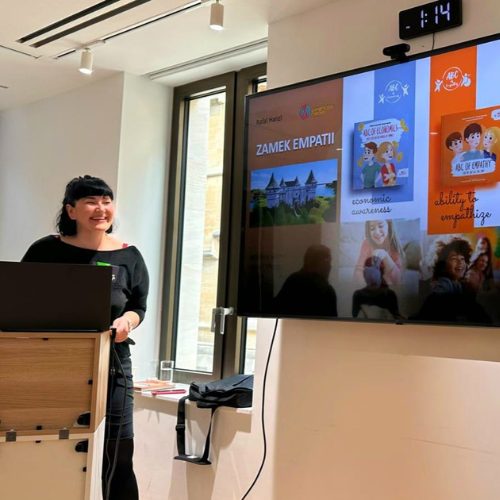
This event brought together students, researchers, and industry professionals to discuss research initiatives and future directions in the exploration of inclusive games.
At the meeting, we introduced the initial concepts for “The Castle of Empathy” game. The project aims to design interactions and game rules for individuals with hearing and visual impairments, as well as to develop accessibility for various neurological and physical differences. The objective is to help children empathize with “the other” through gameplay.
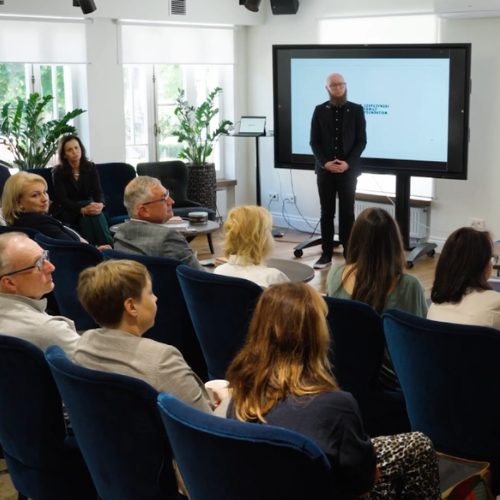 Business meeting in Villa Poranek
Business meeting in Villa Poranek
-A man without empathy is poor,” said Paweł Jakubik (EY Poland) during a business meeting with the Czepczyński Family Foundation. The meeting was profoundly moving, with representatives from foreign corporations and Polish businesses expressing their commitment to collaborating in support of the emotional well-being of Polish children and young people.
ABC of Emotions, how to understand yourself and others?
According to WHO data, depression was the second most prevalent disease globally in 2020, and it may become the most common condition by 2030.
To address these challenges, the CFF team is developing its third educational project, ABC of Emotions (health education), which is set to launch at the start of the 2024/2025 school year.
Recognizing the importance of the education system and the role of preschool and early school teachers, we believe that the significance of the teacher as a specialist who maintains constant contact with the child needs to be continually re-evaluated.
Proper education for teachers can transform them into general practitioners. By recognising symptoms, they will know how to react and support students. Essentially, teachers will become primary care providers within the educational system, conducting preventive measures, engaging in early intervention, and taking initial steps to assist students in crisis situations.
